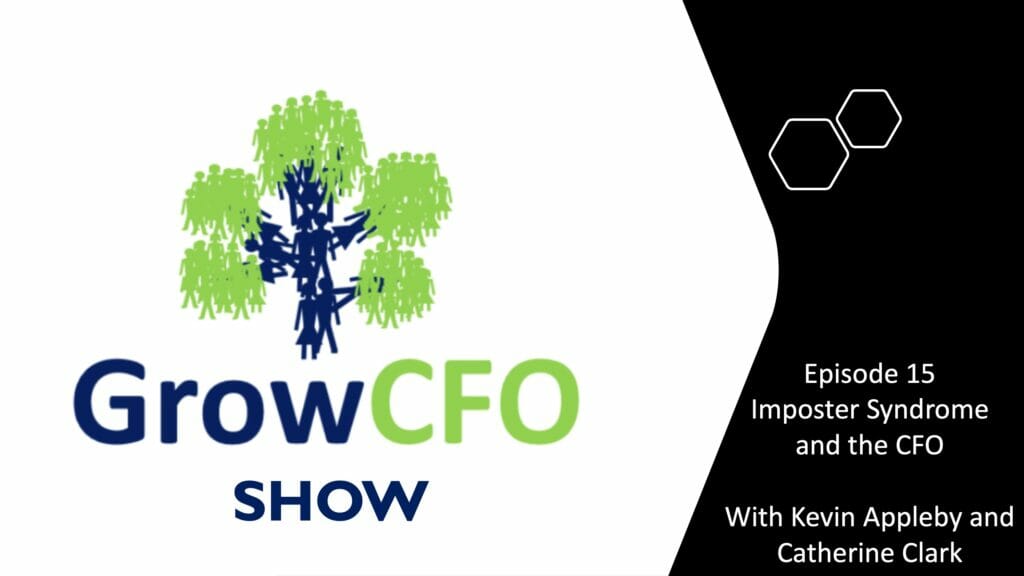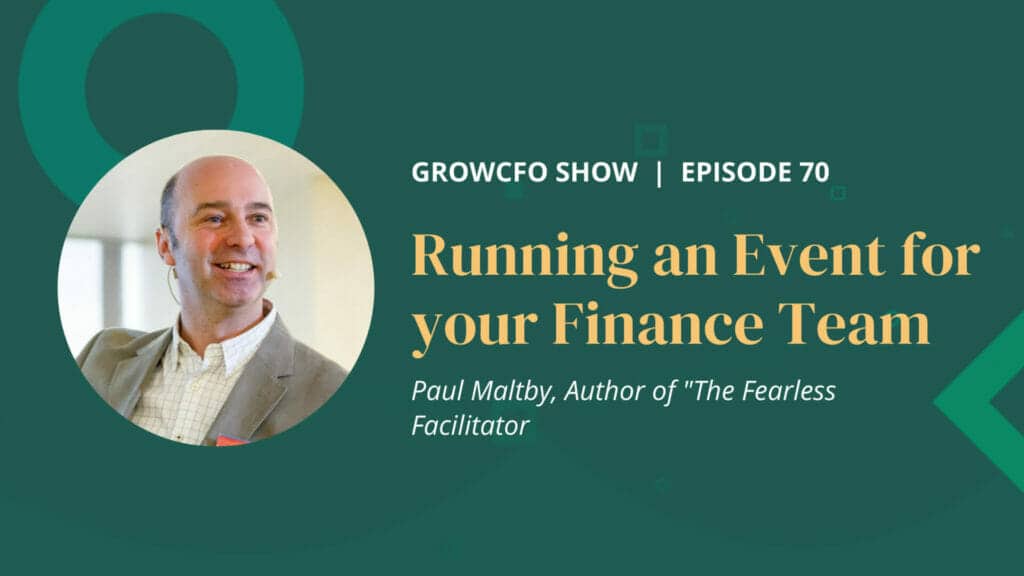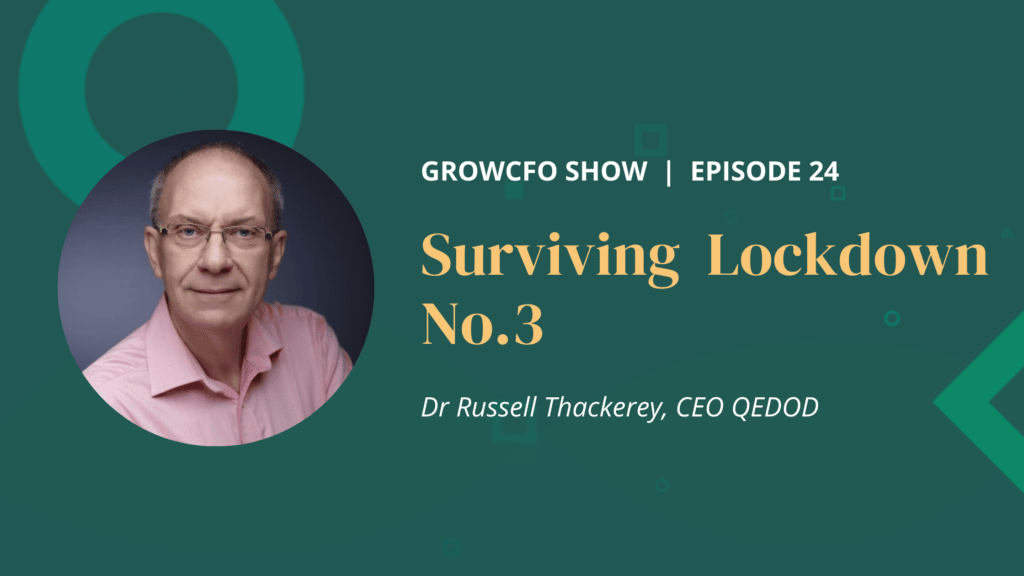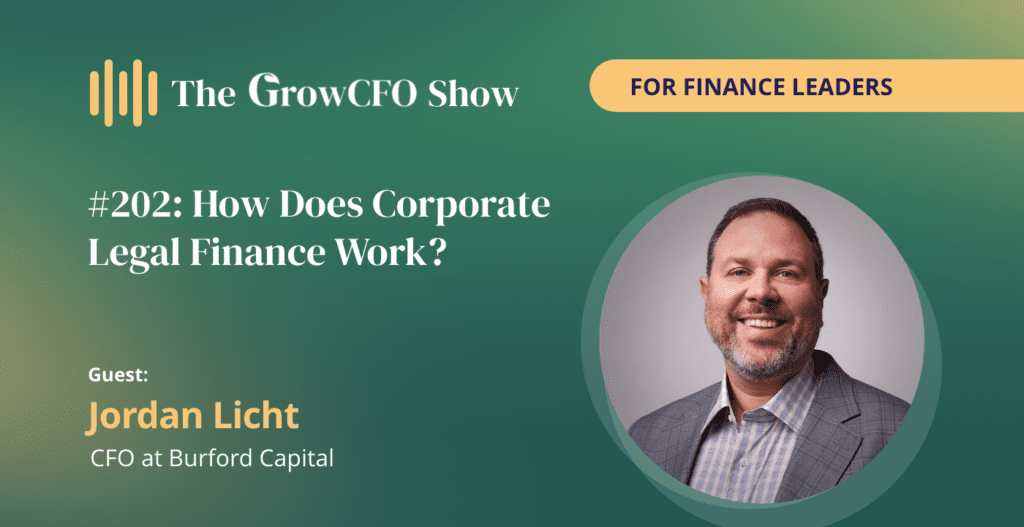#15 Imposter Syndrome and the CFO with Catherine Clark

Catherine Clark joins the GrowCFO to talk about imposter syndrome. Its a problem that Catherine encounters with lots of her mentees. Its something quite common amongst first time CFOs and its something she suffered from herself in her first role as a CFO. In this podcast Catherine gives you some great strategies for coping with imposter syndrome.
What is Imposter Syndrome?
You are in the role that you always wanted, so why do you feel like you don’t deserve it?
What are you thinking right now in relation to your intelligence, skills, or competence? If you’re feeling unworthy in some way, consumed with self-doubt. You may be thinking, ‘I got here by luck’, ‘I just work harder’, ‘I am not really good enough to be here in this role’. The chances are you are feeling like an imposter, and doubting your ability to repeat past successes.
Imposter syndrome is a problem worth sharing
And one worth solving. Because it takes so much emotional energy to deal with the feelings of not being good enough. Lower emotional energy will drain your ability to show up in the way you wish to. It will affect your confidence, productivity, motivation, and influence and ultimately stem your potential to be the best you can be in work and in life.
When you feel like an imposter, there is a gap between how others see you and how you feel inside. You attribute your success to external factors outside of yourself, rather than learning to feel like you have worked hard to deserve your role or the praise and recognition by others. Do you have an underlying fear of being found out? ‘I am not the person others think I am’, I don’t deserve this!’.
Imposter syndrome can arise from social conditioning, self-critical thinking, and family patterning. You may have been brought up to doubt your own self-worth in some way or be in a work environment that promotes self-doubt.
It’s normal to feel this way. You are not alone if you have these thoughts. Research shows that the majority of people feel like an imposter at some point in their life. The feelings can be there all the time, or they can come and go.
Self-awareness is the first step to combat imposter syndrome
The thoughts we are having in life affect our emotions, our bodily sensations, and our behaviours.
I’m going to get straight to the answer, you can change how you think. Despite having around 60,000 thoughts a day, we are not our thoughts! Meditation is one practice that is very helpful in allowing us to sit in the present moment and objectively observe our thoughts without reacting to them.
In the case of imposter syndrome, you may be in a big important meeting and a thought, ‘I am not as good as my colleagues’ emerges. You are likely to feel anxious or worried. Your heart may beat faster. You may feel butterflies in your stomach. You may blush if asked a direct question. As a result, you may withdraw inwards and not speak up with your insight or concern. You may be afraid to ask the questions you would like an answer to. It is often the emotion we notice first, and it is the strength of the emotion that can determine how much you believe the thought.
But imagine if these automatic negative thoughts, often arising from our underlying core beliefs and assumptions and attitudes did not emerge, or if they do you would be able to reframe them? Think how much better you would feel.
We can catch our thoughts and choose to react to them in a different way. It will take effort however we can break lifelong habits, and we can change our own belief system to something new.
Confidence comes from courage.
The courage to be imperfect, to take positive actions, one step at a time to retrain our brains and change and create new neural networks that work for us not against us. Creating new unconscious habits takes time. It will be a daily practice to train the mind ‘muscle’ to perform better and stronger, but it will be worth it to see an improvement in your mental health, your daily mood and how you perceive situations that arise.
This process may feel uncomfortable and challenging, but showing vulnerability and letting ourselves be seen fully is the basis for the creation of deeper relationships and connections. Brene Brown describes this brilliantly in her Ted talk ‘The power of vulnerability.’. It is so important to love ourselves enough to want to make positive changes to feel like we deserve to achieve anything we want to.
Changing your thoughts…
So how do you reframe your thoughts? As I said earlier, it starts with self-awareness – what thoughts are you having? What emotions arise as you have these thoughts, or before you acknowledge the thought? What behaviours arise from these thoughts and emotions? Please pause and breathe and take the time to reflect before you react – what evidence is there to really support these thoughts? How much do you really believe them? If you don’t believe it 100% then there must be some doubt!
Journaling and writing down our thoughts and the implications of our thoughts using the above paragraph as a guide can be extremely helpful.
We can be our own worst critic, so positive self-talk is vital, you must speak to yourself as you would to a good friend.
Here’s a short exercise called ‘The Thought Ladder’ to get you thinking differently:
- Identify your most prominent single Imposter Syndrome current thought e.g. I am not as good as my colleagues
- Consider an alternative thought – what you wish you could believe about yourself e.g. I am intelligent enough to succeed in whatever I choose
- Focus on the middle next steps – 2 or 3 helpful empowering thoughts you could try to think that are more positive than the current one e.g. I still have lots to learn but I am enthusiastic and willing, and I bring a fresh perspective; I have accomplished many things, equivalent skills to my colleagues
- Reflect on how these new thoughts feel. Make sure you believe them.
- Practice them daily – set an alarm with the thoughts on your phone or pin them to a visiblewall.
- The more you think about them the better!If you can take this a step further then acting ‘as if’ you believe the alternative new perspective (even if you do not fully yet) and observing the outcome, the ‘fake it till you make it’ analogy can go a long way to building and projecting more confidence.Thoughts are generally easier to change than beliefs because we tend to live by our beliefs as if they were facts. They are not facts; beliefs are learned and therefore they can be changed by examining the evidence for and against and coming up with an alternative new way of looking at things. Old belief in relation to imposter syndrome: If I am lucky then I will get the role I want.
New belief:
If I work hard with the best intentions, then I am worthy of success.
You can take this a step further. If you take your existing ‘old’ belief you can look at the advantages and disadvantages of believing this with the goal of retaining the advantages and minimising the disadvantages. Often the disadvantages outweigh the advantages, so this creates a lot of motivation for change.
If you can combine thinking differently with behaving differently then imposter syndrome will be a thing of the past! Our experience of situations is caused by our interpretation of events not by the event itself. Otherwise everyone would react the same way to the same situation.
Choose to positively thrive and don’t be so consumed with what other people may think. Build daily routines and habits around the things that matter the most to you and that support your personal energy and ability to think and see clearly. Develop a growth mindset so you enjoy and celebrate the lessons on the road to success. Don’t be afraid to try things out along the way. No-one knows everything and an outcome is never fixed – remember you may not know how to do something yet but with practice, training, learning and support you will.
Ask for help from a mentor
In my view there is no choice other than to instigate change and to get the support you need from friends, family, and colleagues. Often you need a more independent supporter. A coach or mentor will help you to see a different perspective. A mentor can help you to create alternative thought patterns and solutions to problems you identify.
Choosing a mentor can be a daunting task. You really need to find the right person. Chemistry between mentor and mentee is vital for the relationship to work. GrowCFO can help you find a mentor that is right for you. If you are interested in mentoring then you can find out more here
Catherine’s own experience of imposter syndrome
I felt like an imposter when I was promoted to the Board of Directors. On the outside I appeared confident but on the inside that is not how I felt, and it was exhausting. In the first year of my appointment, I felt less worthy. I felt less valued than my board colleagues and this made me feel sad and at times angry. I was encouraged to speak up more but because I perceived my opinions were less valid, less knowledgeable, less well received.
The result? I lost the voice I should have had. I had the platform to make a big difference, yet I wasn’t able to take full advantage of that. It didn’t happen overnight but with time and effort I found the confidence to be me. I sought support to uncover and unlock the thoughts that were holding me back from being the person I wanted to be. I reached a point where my negative thoughts felt like they were suffocating me, and I had to change. Life isn’tperfect and new situations can trigger my old thought patterns. With the tools to support myself my imposter feelings are significantly reduced.
I became a mentor because I have a passion for supporting people to be and feel the best they can, and to help them to believe in themselves and their value so they can bring even more value to their businesses and their lives. I strongly believe it is worth investing in yourself to get support so you are not wasting precious time and worry in thoughts and beliefs that may hold you back and stop you being the person you deserve to be.
Resources we mentioned in the show
Kevin recommended “Atomic Habits” by James Clear. The book has some great advice on creating new thoughts, behaviours and habits.
Concluding thoughts…
Imposter Syndrome is unlikely to go away completely but it can lessen.
Those feelings of self-doubt will creep back in, however they can be useful because you need to step out of your comfort zone, try new things and feel the fear of the unknown to grow to our full potential, so don’t let it hold you back!
Podcast: Play in new window | Download







Responses